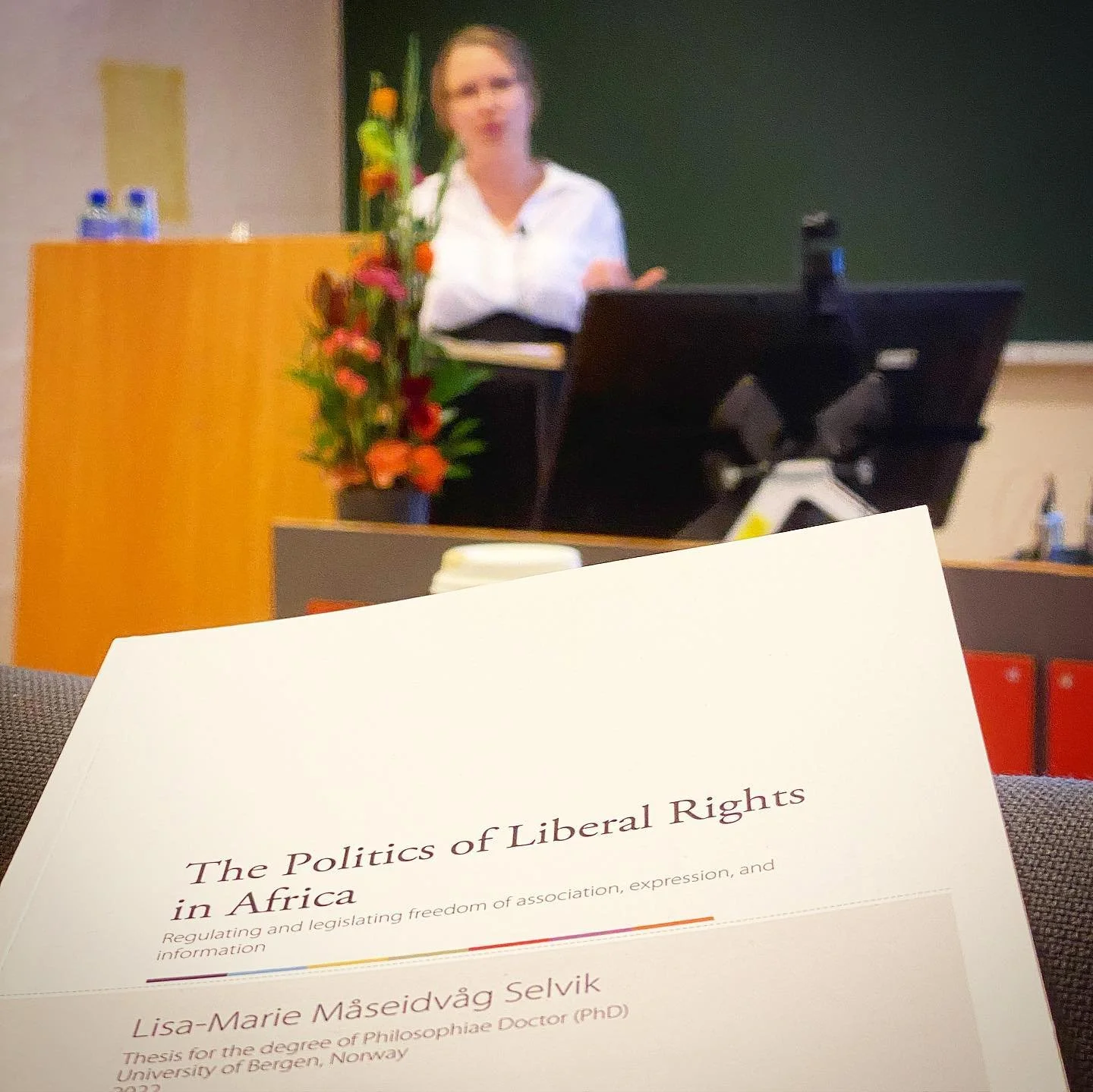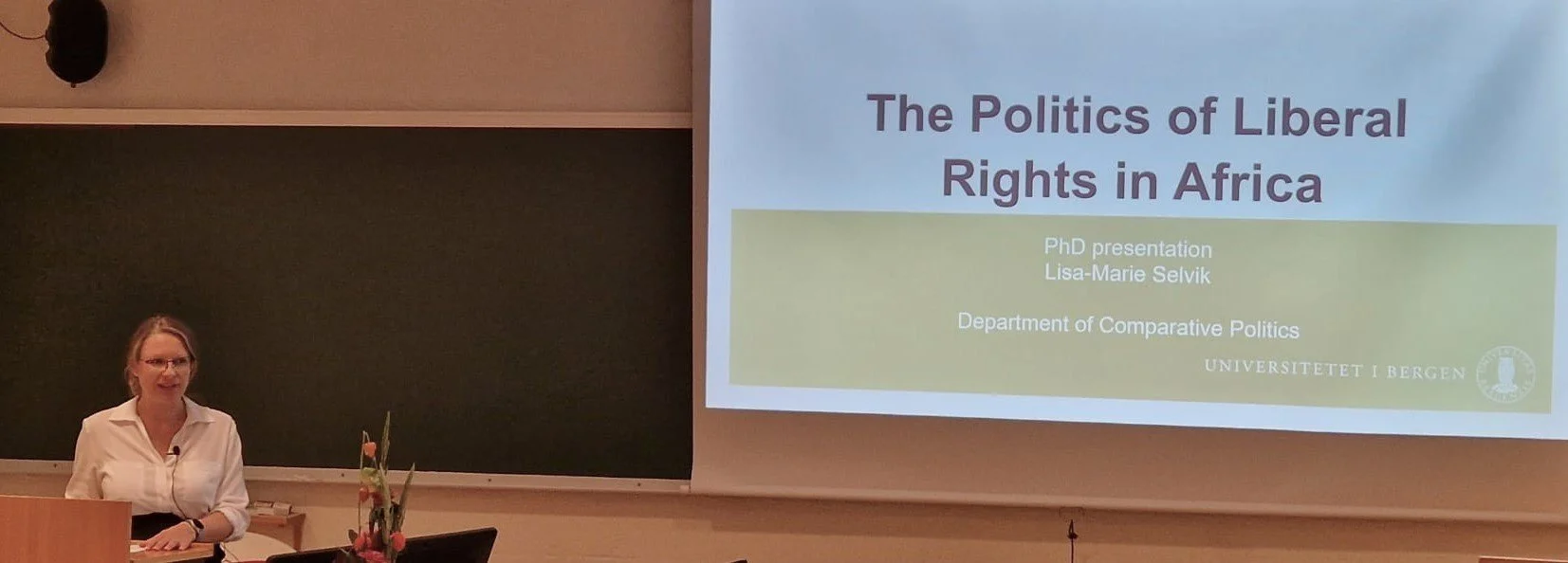Doctoral Defense: “The Politics of Liberal Rights in Africa”
Has parts
Paper 1. Garbe, Lisa, Lisa-Marie Selvik & Pauline Lemaire. (2021). “How African countries respond to fake news and hate speech”. Information, Communication & Society. The article is available at: https://hdl.handle.net/11250/2992004
Paper 2. Selvik, Lisa-Marie (under review). “Intended or Inverted Democratic Laws? Examining the Manipulation of African Right to Information Laws”. Not available in BORA.
Paper 3. Selvik, Lisa-Marie (under review). “Rights Advocacy in Ghana. Strategic interactions between advocates and politicians”. Not available in BORA.
Paper 4. Selvik, Lisa-Marie (2021). “A Platform or Partner: Engaging the Media in Advocacy”. Global Policy. 12 (55), 70-83. The article is available at: https://hdl.handle.net/11250/2988417
Paper 5. Selvik, Lisa-Marie & Kendra Dupuy (under review). “Government Repression and Citizen Support for Democratic Rights in Africa”. Not available in BORA.
Publisher
The University of Bergen
Copyright
Copyright the Author.
Project member and PhD Candidate Lisa-Marie Selvik successfully defended her PhD thesis titled “The Politics of Liberal Rights in Africa” on 2 September 2022.
10:15-11:00 Trial Lecture
Given topic: “”Determinants of political liberalization: mobilizing strategies of civil society versus regime strategies in emulation of neighbouring authoritarian regimes”.
11:30-15:30 Public Defense
The Evaluation Committee consisted of:
-
First opponent: Assistant Professor Hannah Smidt, School of Economics and Political Science, University of St. Gallen, Switzerland
-
Second opponent: Professor Nicholas Cheeseman, International Development Department, University of Birmingham, UK
-
Leader of committee: Associate Professor Michael Alvarez, Department of Comparative Politics, University of Bergen
The PhD thesis is available at the University of Bergen’s open reseach archive!
Thesis supervisors: Lise Rakner and Kendra Dupuy.
Abstract
How does the contestation for liberal rights play out in Africa’s multiparty democracies? This question forms the centre of inquiry in this thesis. Though African democracies to a large extent have embraced the electoral democratic tradition, democratic governance practices linked to the liberal components of democracy, accountability and civil liberties – hereunder liberal rights such as association, expression, and information rights – are still contested. Underlying the outward appearance of stalled democratic progress, this thesis will show that contention is playing out as a highly dynamic interaction in African democracies between those advocating for liberal rights on the one hand, and those challenging them on the other.
Focusing on elite-level interactions, notably between right advocates representing civil society on the one hand and politicians on the other hand, this thesis focuses on the contentious politics of regulating and legislating freedoms of association, expression, and information. The articles in the dissertation ask what explains strategies of government repression of liberal rights, what explains strategies of liberal rights advocacy, and what are the consequences of repression of and pushback against liberal rights?
This dissertation builds on and contributes to the literatures on democratic backsliding and civil society clampdown. On the one hand, the backsliding literature is useful for its focus on actions and strategies of political leaders. However, while existing studies on democratic backsliding increasingly focus on elite dynamics, the focus has primarily been on other political actors, such as opposition and courts, and not on members of civil society. On the other hand, while the civil society clampdown literature says more about the relationship with politicians, it rarely portrays civil society advocates as elite actors with an agency to shape this relation. While much scholarly attention has been afforded to political elites, elites within civil society have received less attention. The dissertation contributes to theory development in two significant ways. First, it includes an elite perspective of civil society actors and, second, it nuances the scholarship on democratic backsliding by emphasising the iterative relations between political elites and civil society actors.
This compilation PhD dissertation is composed of five independent articles, all focusing on processes of regulating and legislating liberal rights in Sub-Saharan Africa. All articles are concerned with the strategies of government and civil society actors, either one or both. Two of the articles in particular study the dynamics and interactions between political and societal elites in the case of drafting and advocating for the Right to Information Act (2019) in Ghana.
Theoretically, methodically, and empirically, all articles stand on their own. To varying degrees, the five articles combine quantitative as well as qualitative data and methods and while some of them are classical single-case studies, others take a cross-national perspective.
The two first articles speak to government strategies of repressing liberal rights. While Article 1 (How African countries respond to fake news and hate speech, co-authored with Lisa Garbe and Pauline Lemaire) identifies government strategies to regulate online information in Africa and evaluates which regime characteristics shape the choice of strategy, Article 2 (Intended or Inverted Democratic Laws?) further examines legislative strategies in how lawmakers are writing and designing African right to information (RTI) laws. The two next articles speak to advocacy strategies in promoting the right to information in an African democracy, Ghana. Article 3 (Rights Advocacy in Ghana) identifies the challenges that rights advocates face even in a relatively open and unconstrained political context and examines the strategic interactions between advocates and politicians. Article 4 (A Platform or Partner) focuses on advocates’ strategies and their interaction with media actors and identifies the mechanisms of how advocates engage media actors as partners in advocacy work. Finally, Article 5 (Government Repression and Citizen Support for Democratic Rights in Africa, co-authored with Kendra Dupuy) speaks to the consequences of government repression of liberal rights, examining the relationship between government repression of civil society and media actors and citizen support for government control over freedoms of association and the media.
In sum, this compilation dissertation offers a comparative perspective on the politics of liberal rights in African democracies, both with regards to the political pushback against liberal rights and rights advocacy and with regards to the challenges faced by rights advocates and how they strategize to circumvent these. It highlights the significance of understanding strategies and argues that the continued study of the ‘politics of liberal rights’ should focus on actors and agency, should to a greater extent recognise diffusion and learning mechanisms, and should seek to better understand the narratives and justification for political pushback against liberal rights.



